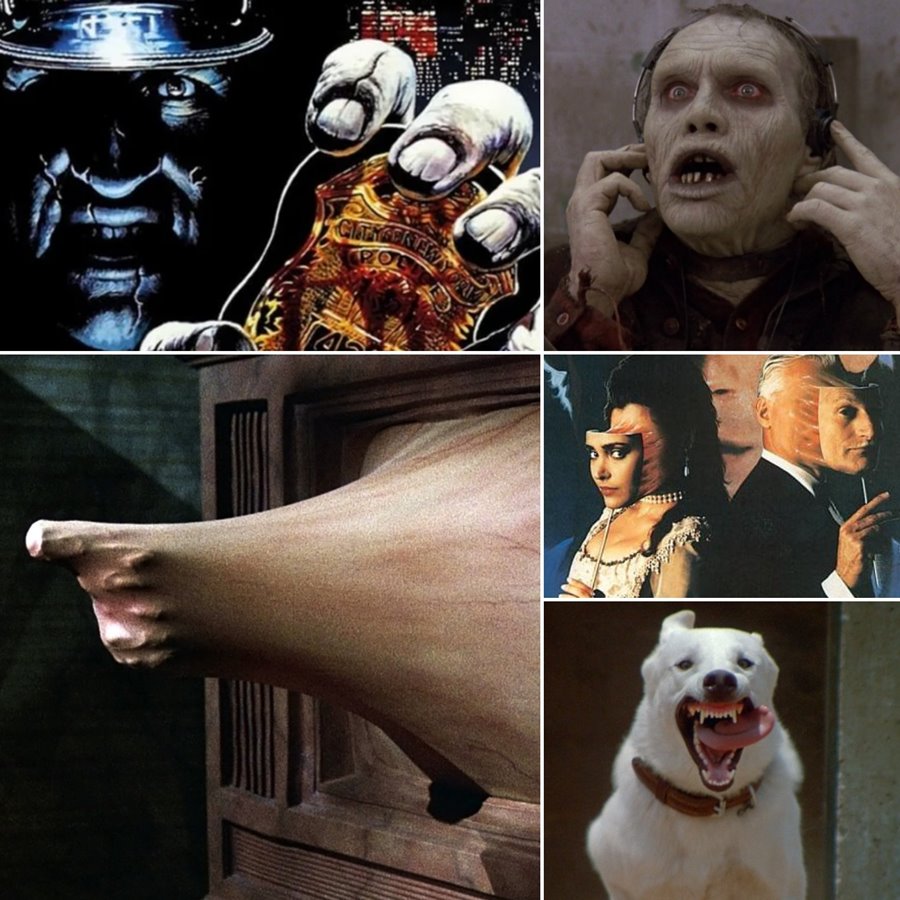FILMxFIVE: Five Political Horror films from the 1980s
by Aster Gilbert, GenreQueer Programmer

Jordan Peele’s Get Out (2017) rekindled mainstream interest in horror movies as a meaningful engagement with politics. By blending traditions of exploitation horror with frank depictions of anti-Black racism, films like Get Out and Us (2019) brought serious discussions of race and class to American genre filmmaking. Too often dismissed as low brow, exploitation horror has a long history of tackling messy political subjects on modest budgets. Exploitation horror movies tap directly into the social and political climate of their time, often depicting the lived realities of women, Black, queer, and poor people as the basis for their fantastical plots. By doing so, the fears of violence perpetrated by institutions of power become symbolized by prosthetic monsters.
The 1980s was a fruitful time for politically engaged horror films in North America. The conservative revolution that brought Ronald Reagan to power saw an expansion of racist policies with the War on Drugs, the militarization of the police, and a dramatic rise in income inequality. Not to mention the chauvinist and anti-LGBTQ attitudes of the Moral Majority, crusades against rap music, the gutting of the industrial workforce, and the expansion of illegal secret wars and CIA-backed coups, filmmakers in the 1980s had plenty of real-world horror to draw upon.
The decade of Reagan and MTV was also a renaissance for North American horror films. It was the golden age of the slasher and the birth of body horror, with breakthroughs in practical effects and new audience interest in realistic gore. While most horror films can be viewed for their politics, the following five films are notable for the direct engagement with topics of anti-Black racism, police brutality, and the power of the wealthy elite. These are also five of my all-time favorite horror films.
Day of the Dead
(dir. George A. Romero, 1985)
The third entry in George Romero’s genre-defining Dead series takes us to an underground military bunker where tensions are rising between a handful of civilian scientists and a dwindling platoon of soldiers. As a hot-headed new officer takes command, the army unit descends into a fascist domination of the civilians, who have been charged with finding a cure for the zombie plague. My personal favorite of the OG Dead Trilogy, Day of the Dead is a scathing critique of US military chauvinism during the Reagan era. No stranger to obvious political metaphors, Romero uses the undead corpses as an allegory for how institutions of power continue on in a zombie-like state, even after total societal collapse. In Day of the Dead, the zombies are the least threatening enemy as the beleaguered civilians fight to survive the racism, sexism, and brutality of the soldiers. Day of the Dead is also known for featuring some of special-effects master Tom Savini’s greatest work: gut-churning gore effects and Bub, the zombie who learns to love!
Day of the Dead is currently available to stream on Hulu and Shudder.
Maniac Cop
(dir. William Lustig, 1988)
Maniac Cop opens with a highly-racialized scenario: a white woman running from two Puerto Rican men trying to rob her. She runs into the arms of a tall white police officer, crying for help. But instead of assisting her, the cop brutally murders the woman. Maniac Cop is a late-80s slasher unlike any other where the killer is a New York City police officer. The disbelief that one bad apple could be killing innocent white people enables the murders to continue, and sows the seeds of anti-cop paranoia throughout the city. The film’s politics are messy, and born out of the contradictory ideologies of its filmmakers: written and produced by left-wing exploitation master Larry Cohen (Bone, The Stuff, A Return to Salem’s Lot) and directed by right-wing fantasy auteur William Lustig (Maniac, Vigilante). The film reimagines the racist violence of the police as a threat to white people, but throughout the film news interviews with Black and Puerto Rican citizens about police brutality remind viewers that the film is not just a white fantasy. Cohen’s script smuggles in the growing suspicion towards the militarized New York Police department with a killer cop who stokes distrust of police throughout the city. Maniac Cop is a true standout entry into the oversaturated slasher genre of the late 1980s and stars cult horror icon Bruce Campbell.
Maniac Cop is currently available to stream on Shudder.
Society
(dir. Brian Yuzna, 1989)
Bill is a rich high school jock who’s paranoid that his super-elite family hates him. He tells his therapist how alienated he feels by their icy demeanor and obsession with socialite rituals. His suspicions get confirmed when he’s given an audio recording of his sister’s coming out socialite ball, which sounds like an incestuous orgy including prominent wealthy leaders of the community. Soon the whole town, from prep school snobs, the police, and even his own therapist seem to be in on some secret society conspiracy. Bill’s obsession with uncovering the truth drives him further down the rabbit hole, resulting in one of the most jaw-dropping horror climaxes in film history. Featuring some of the most memorable special effects of 1980s body horror, Society must be seen to be believed. Two decades before the language of the 1% and the 99%, Society depicted wealthy white elites as a different species entirely, one that preys upon the working class and anyone who doesn’t help them to reproduce their interests and maintain the status quo.
Society is currently available to stream on Shudder and purchase on Blu-ray from Arrow Video.
Videodrome
(dir. David Cronenberg, 1983)
Max Renn (James Woods) is the president of a small-time TV station that specializes in broadcasting sleaze. He’s on the lookout for the next great program that will push the limits of sex and violence on TV, when he happens across a pirate broadcast called “Videodrome.” The untraceable pirate broadcast is pure, uncensored filth: sex, torture, and murder. Max’s obsession with acquiring Videodrome for his viewers leads him down a dark political conspiracy where right-wing politicians and business leaders are using the media to mutate their political enemies into techno-organic assassins, brainwashed by secret broadcast signals and Betamax tapes! My personal favorite from master director David Cronenberg, Videodrome is a one-of-a-kind body horror experience. Prefiguring the moral panic surrounding internet pornography and the conservative culture wars that continue to shape our world today, Videodrome uses the media landscape as a life and death struggle for political domination. Here, freedoms of speech and expression get tangled up in a confusion of deadly political messaging and lone-wolf gunman. Videodrome also stars Blondie’s Debbie Harry. Long Live the New Flesh!
Videodrome is available to rent from Amazon Prime, YouTube, iTunes, and other digital retailers.
White Dog
(dir. Samuel Fuller, 1982)
Julie is a dopey actress (Kristy McNichol) who befriends a stray all-white German Shepard. When she fails to locate the owner, she keeps the dog for protection after a home invasion. But she soon discovers the dog’s terrible secret: it’s a murderous attack dog trained by white supremacists to attack Black people—a “white dog.” Julie takes the dog to an animal training facility where Keys (Paul Winfield) becomes obsessed with deprogramming the dog’s racist training. An in-your-face metaphor for the social conditioning of racism, White Dog raises questions of blame as the killer dog’s rampage is enabled by a white woman who refuses to have the dog put down, despite repeated calls for her to do so. A film about hope in the face of racist terror, White Dog is a searing indictment of the limits of reform. Written and directed by Hollywood maverick Samuel Fuller, who was among the first white Hollywood filmmakers to tackle American racism in his Korean War drama The Steel Helmet (1951). White Dog features his signature pulpy style; like a no-nonsense journalist straight out of a Hollywood noir.
White Dog is available to purchase on DVD from The Criterion Collection.

Posted by: Tom Fuchs